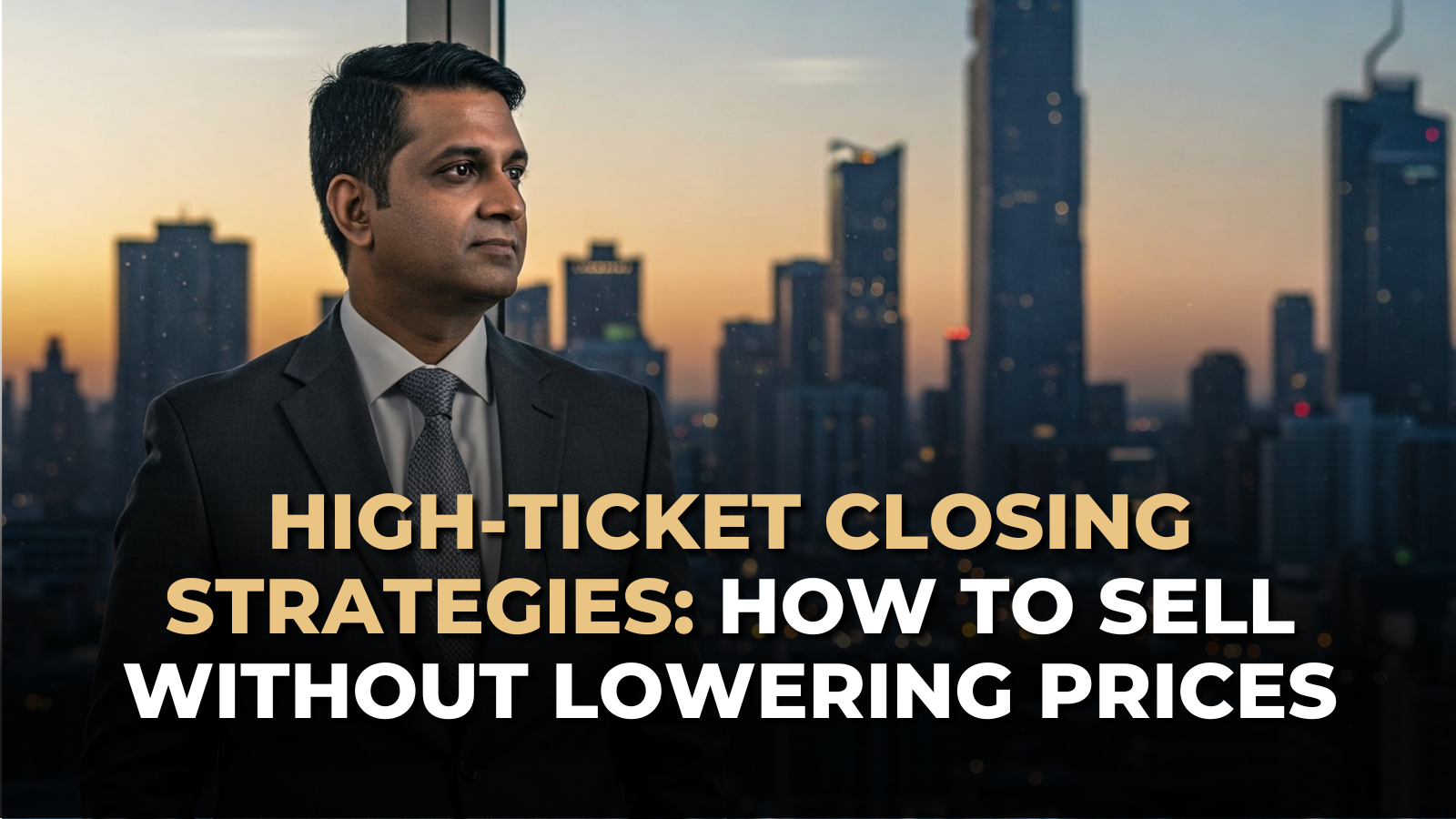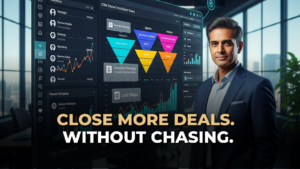“Your price is too high.”
“Can you offer a discount?”
“I can get this cheaper elsewhere.”
If you’re hearing this from prospects, you’re closing deals the wrong way.
Most entrepreneurs panic when they get price objections. Addressing price objections effectively involves reframing the conversation from cost to value. Instead of slashing prices or offering discounts, focus on understanding customer concerns and demonstrating the long-term benefits of your product. This approach can lead to successful outcomes.
Cheaper alternatives may seem appealing upfront, but they often come with hidden costs. Cheaper options might save money initially, but these savings can be outweighed by potential hidden costs, making the overall value of your product more compelling.
That’s weak.
Table of content
Introduction to High-Ticket Sales
What Makes High-Ticket Sales Different
The Fatal Mistakes That Kill High-Ticket Deals
Rule #1: Control the Frame from the Start
Why Frame Control Matters in High-Ticket Sales
How to Set Authority Early in the Sales Process
Use an Application Process to Flip the Power Dynamic
Rule #2: Anchor the Value, Not the Price
Show the Cost of Inaction
Make Your Offer Feel Like a Shortcut, Not an Expense
Address Financial Constraints With Confidence
Rule #3: Handle Objections Before They Arise
Use Content to Pre-Sell Authority
Address Specific Concerns Through Social Proof
Leverage Deep Product Knowledge to Create Trust
Rule #4: Be Willing to Walk Away
Detachment Is the Ultimate Power in Sales
Create Scarcity Without Hype
When You Stop Needing the Sale, Prospects Chase You
Building Relationships and Trust
Establishing Genuine Connections with Prospects
Maintaining Trust Throughout the Sales Process
Going Beyond the Basics: High-Ticket Closing at the Next Level
Offer Tailored Solutions Based on the Prospect’s Industry
Highlight Safety Features and Risk Reduction
Show Them the Bigger Picture
Closing High-Ticket Deals Like a Pro
Handle Price Objections Before They Happen
Demonstrate Value with Precision
Build Trust Through Authority, Not Flattery
Close Like the Authority You Are
High-Ticket Sales Is a Skill—And Every Skill Can Be Improved
Track the Metrics That Actually Matter
Commit to Continuous Learning and Feedback
Close Premium Clients with Confidence—No Discounts Required
Ready to Master High-Ticket Closing?
Looking to improve your sales skills? Discover The Art of Closing High Ticket Sales from the Dan Lok Shop, a comprehensive program to elevate your sales techniques.
High-ticket buyers don’t choose based on the sticker price.
They choose based on perceived value, emotional connection, and certainty that you are the right choice.
If you need to lower your price to close, the problem isn’t your offer—it’s your positioning.
Because here’s the truth:
Cheaper alternatives may seem appealing upfront, but they often come with hidden costs—lost time, poor results, wasted energy.
In the long run, trying to save money can cost your prospects far more than investing in a premium solution today.
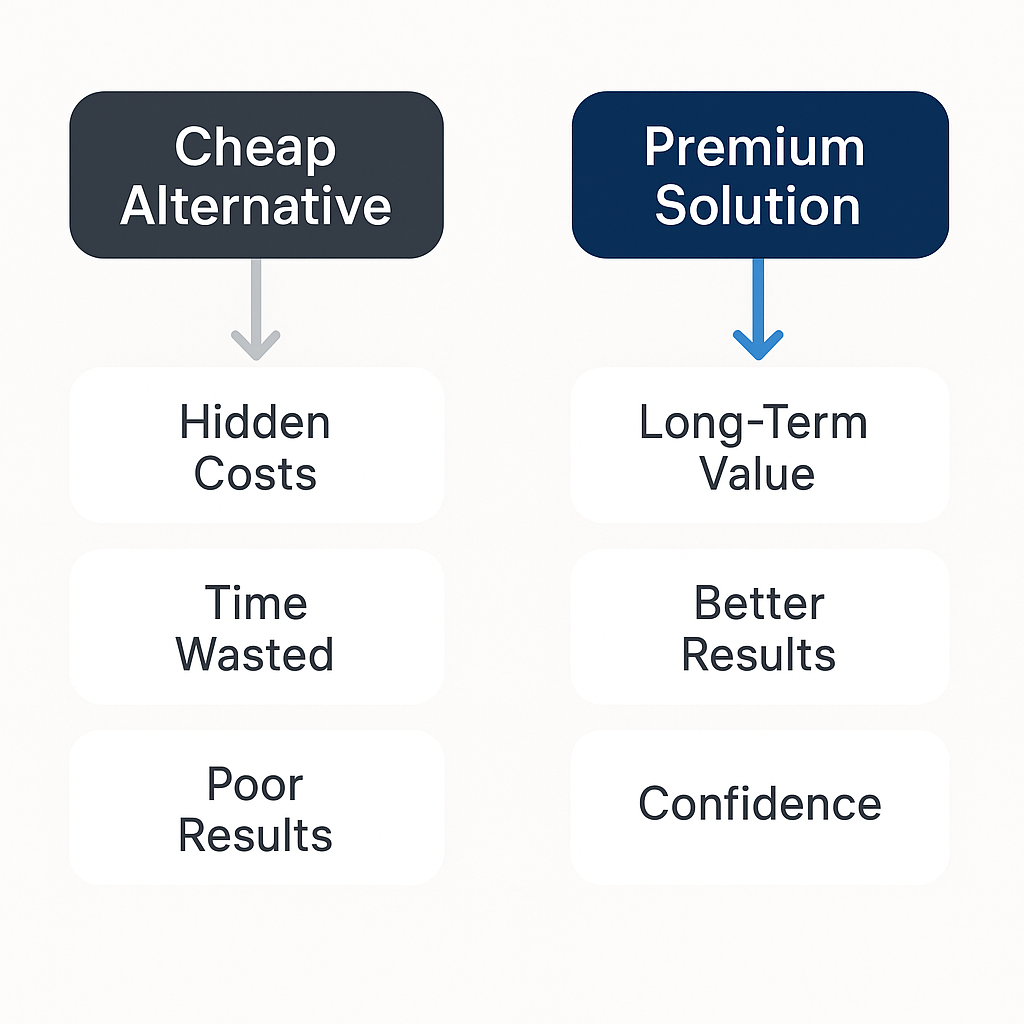
When you position your offer as a long-term value investment, price objections disappear.
You stop chasing clients—and start closing deals with power.
In this guide, you’ll discover exactly how high-ticket closers operate differently—so you can sell premium offers without ever lowering your prices again.
Introduction to High-Ticket Sales
High-ticket sales isn’t about pushing a product.
It’s about delivering so much value… the price becomes irrelevant.
When you’re selling a premium offer—$1,000, $10,000, or more—you’re not in the transaction business anymore.
You’re in the transformation business.
Your prospect isn’t just buying a solution.
They’re buying certainty.
Certainty that you understand their business… their pain points… and their desired outcome better than they do.
That’s why low-ticket tactics fall flat in this world.
You can’t “volume-close” your way to high-ticket success.
You need precision. You need posture.
You need a sales strategy that positions you as the only logical choice.
High-ticket closers don’t just take orders.
They lead.
They ask better questions.
They understand the client’s business model, the industry trends, and the hidden obstacles standing in the way of success.
And when they speak, clients listen—because they speak with depth, not desperation.
At this level, building strong relationships isn’t optional.
It’s everything.
Your ability to listen actively, speak with confidence, and deliver tailored solutions determines whether you close the deal—or lose the frame.
If you want to master high-ticket closing, forget about being “just a salesperson.”
You must become a trusted advisor who commands attention, controls the conversation, and closes with clarity.
Because when you get it right, high-ticket sales becomes more than a job.
It becomes a powerful growth engine—one built on trust, transformation, and long-term value.
In the world of sales, not all deals are created equal. High-ticket sales—deals typically valued over $1,000—require a completely different mindset and skill set than selling low-ticket offers.
It’s not just about transferring information. It’s about creating emotional certainty, positioning yourself as an expert, and making the client feel that working with you is the only logical choice.
In high-ticket closing, prospects aren’t simply comparing prices. They’re evaluating the long-term value of their investment, the trust they feel toward you, and the risk of choosing someone else who doesn’t deliver. Understanding these factors from the customer’s perspective is crucial, as it helps you address their unique mental models and pricing benchmarks.
That’s why high-ticket closers are not just “salespeople.” They are sales professionals who master frame control, objection handling, and the art of addressing pain points before they even arise. They also build relationships by connecting deeply with clients and understanding their needs and pain points.
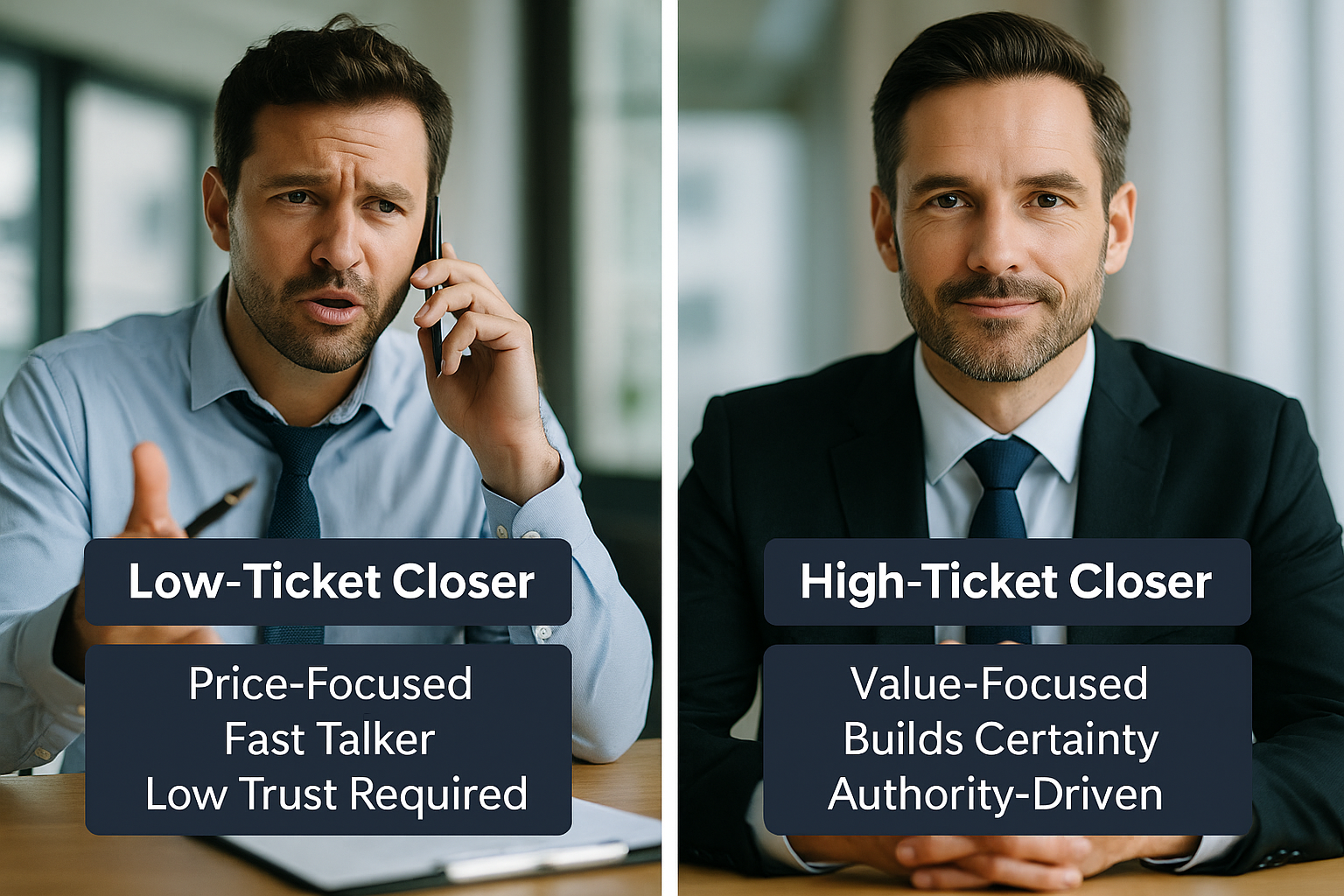
If you’re serious about building a sustainable business model, mastering high-ticket closing strategies is non-negotiable. You don’t just close deals—you create lasting relationships, loyal customers, and high lifetime value.
And it all starts with understanding the unique dynamics of the high-ticket sales process.
Most sales reps don’t fail because they lack hustle. They fail because they approach high-ticket clients with a low-ticket mindset.
They treat high-value prospects like they’re just another name in a CRM. They talk too much. They push too hard. They focus on the initial price, instead of anchoring the real value of their offer.
Here’s what typically happens:
The salesperson gets a lead. They jump on a call too quickly—without pre-framing the conversation. They start pitching features and bonuses without considering potential objections. Then comes the hesitation from the client…
“Let me think about it.” “This sounds good, but I need to compare.” “Can you offer a better deal?”
The deal stalls—or dies.
Why?
Because the salesperson failed to control the frame, demonstrate authority, and build trust before discussing price. They also neglected to understand and address the prospect’s concerns effectively.
When you’re closing high-ticket deals, you’re not just selling a product or service. You’re selling certainty. You’re solving pain points the client may not even fully understand yet.
To do that, you must position yourself as a sales expert, not just someone trying to hit quota. You must become a trusted advisor, not a pushy closer.
In high-ticket sales, the deal is won or lost in the first five minutes.
Why? Because the first impression defines the power dynamic.
If your sales conversation starts with the client feeling like they’re in control, they’ll negotiate, stall, or challenge your price. If it starts with you establishing authority, clarity, and intent—you’ll lead the conversation and close more deals. Ensure that the customer sees the long-term value and benefits of your product to overcome any objections related to pricing.
The frame determines everything.
Why Frame Control Matters in High-Ticket Sales
Low-ticket prospects care about features.
High-ticket clients care about certainty.
They want to know:
- Do you truly understand my pain points?
- Are you the best solution for my specific concerns?
- Can I trust you to deliver?
The moment you sound like “just a salesperson,” you lose control.
High-ticket closers position themselves as trusted advisors—with deep product knowledge, clear intent, and unshakable certainty.
Frame control is about leading, not reacting.
And that starts before the call even happens.
How to Set Authority Early in the Sales Process
You don’t gain authority on the call—you pre-sell it through your positioning.
Here’s how professionals structure their sales approach:
- Pre-Sell Before the CallUse content, testimonials, and authority positioning to kill objections before they arise.
- Qualify, Don’t ChaseThe application process should filter out time-wasters and show prospects that access to you is earned, not expected.
- Set the Expectation EarlySay this before you ever talk numbers: “I don’t do discounts. If price is your main concern, this probably isn’t the right fit.”
This subtle but firm posture shifts the prospect’s perspective. Understanding the product’s perceived value is crucial, as it helps address how customers assess value in relation to pricing.
When you bring up price, don’t just talk numbers—talk timing and strategy.
Top closers don’t let the prospect lead the conversation. They position the price as a reflection of value, timing, and transformation.
Every word you say should raise certainty, not doubt. Because when you control the frame, the price stops being a question—and becomes the logical next step.
Use an Application Process to Flip the Power Dynamic
This is your pro move.
Instead of inviting everyone to book a call, use an application funnel that asks key qualifying questions:
- What’s your biggest business challenge?
- Why are you looking for help now?
- Are you ready to invest in a solution if it’s the right fit?
By the time they get on a call with you, they’ve already committed emotionally—and filtered themselves in.
High-ticket sales teams that implement this structure consistently outperform those who chase leads blindly.
If your prospect says your offer feels too expensive, they’re not rejecting the price. This is a common price objection that salespeople face. They’re rejecting the value perception.
Price objections are never about the price—they’re about the product’s perceived value.
When you shift the conversation from cost to transformation, you don’t just handle objections—you eliminate them.
Show your prospect the long-term benefits. Highlight what makes your offer unique.
And suddenly, what once felt “expensive” becomes the most logical decision they could make.
That’s your fault—not theirs.
Most sales reps focus on features, deliverables, or payment terms. But high-ticket closers don’t sell deliverables. They sell transformation.
In high-ticket sales, the real close doesn’t happen when they hear the price. It happens when they realize what it will cost them not to buy.
Show the Cost of Inaction
This is where true sales professionals shine.
Instead of justifying your price, highlight what’s at stake if they do nothing:
- Lost revenue
- Missed opportunities
- Months (or years) of wasted effort
- Continued frustration and overwhelm
Don’t just nod at their money concerns—dig deeper.
Is it really a budget issue, or are they just tight on cash flow right now?
When you make that distinction, you stay in control of the frame.
And once you’ve diagnosed the real problem, you can confidently shift the conversation back to value—not price.
Because if your offer solves a real problem, the price becomes irrelevant.
Ask them: “What happens if you’re still in the same situation 6 months from now?”
This question hits harder than any pitch. Address potential objections early to ensure all concerns are managed effectively.
You’re not selling a product. You’re helping them avoid the pain of staying stuck.
Make Your Offer Feel Like a Shortcut, Not an Expense
You must position your high-ticket offer as the fastest, smartest path forward—not just a “program” or “package.”
Use comparison framing:
Weak Positioning:
“This coaching program is $15,000.”
Powerful Positioning:
“Most people waste 2–3 years and over $100,000 trying to figure this out on their own. This shortcut is only $15,000.”
See the difference?
One feels like a cost.
The other feels like a no-brainer investment.
This technique helps you overcome price objections without lowering your fee.
Address Financial Constraints With Confidence
If a prospect brings up cash flow or budget constraints, don’t flinch. Acknowledge it. Then reframe it.
Say something like: “Totally fair. But let me ask you this—what would it cost you to stay where you are for another year?”
When you show them how inaction is the most expensive choice, they’ll start seeing your offer for what it is: a high-leverage solution. If a prospect says your price is too high, don’t flinch.
That’s not an objection—it’s an invitation.
An invitation to lead.
Your job isn’t to argue or justify. It’s to shift their focus from sticker shock to strategic value.
When you position your offer as the smarter, faster path to their goal, price stops being the problem—and starts looking like a bargain.
Never discount out of desperation.
Demonstrate value with certainty. That’s how true closers handle pricing objections—without lowering a single dollar.
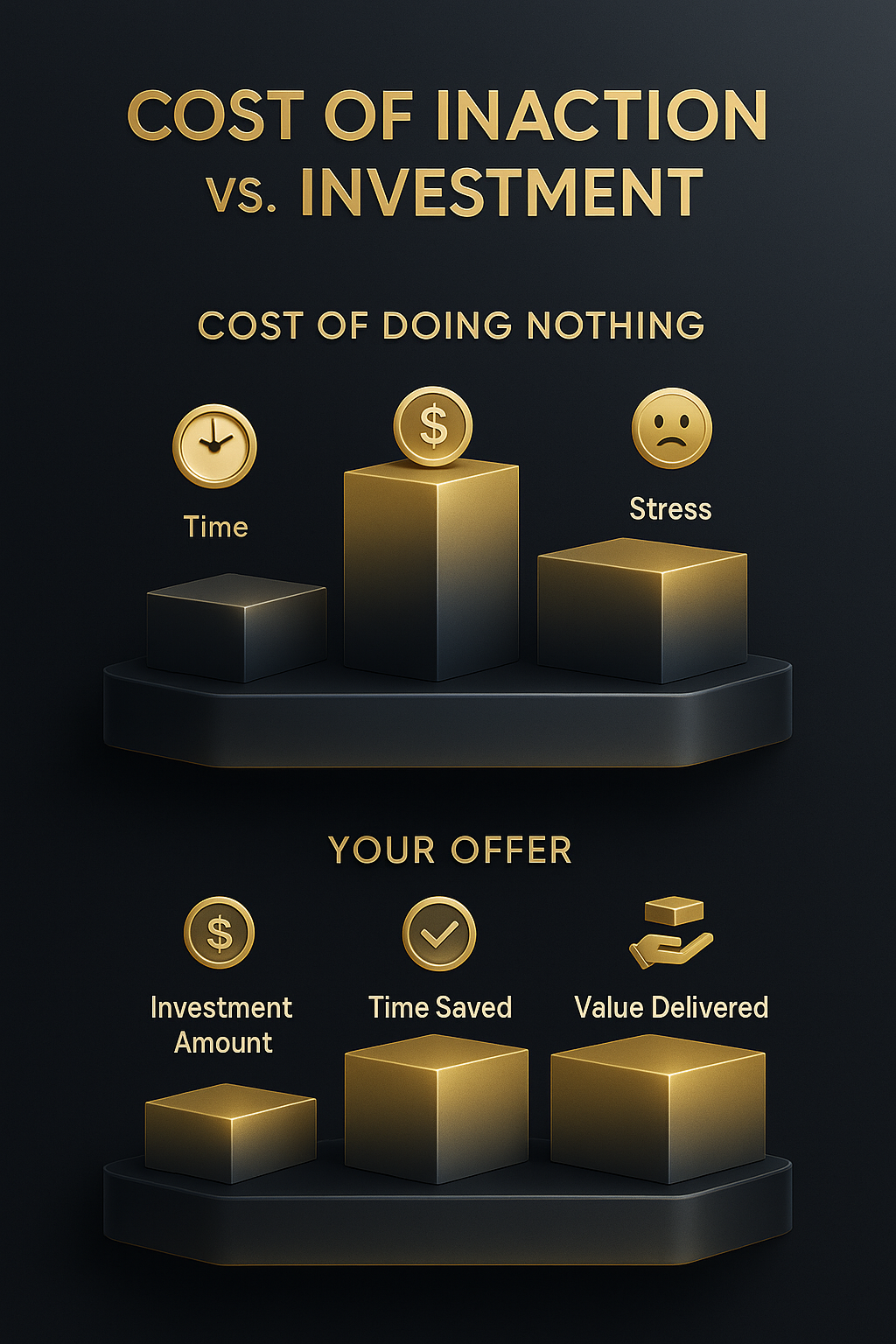
Rule #3: Handle Objections Before They Arise
Amateurs wait for objections. Sales experts eliminate them before they even show up.
In high-ticket closing, the biggest mistake you can make is waiting until the sales call to address doubts, fears, or concerns. By then, it’s often too late.
Instead, your sales funnel, content, and reputation should do the heavy lifting.
Your prospect should arrive at the call already convinced that:
- You understand their pain points
- Your offer works
- You’re the obvious solution
If you want to close premium deals, you need to stop selling and start seeing the world through your prospect’s eyes.
Understanding their perspective isn’t just helpful—it’s non-negotiable. That’s how you uncover what they truly value—and how they justify the price in their mind.
By the time they get on a call with you, they shouldn’t need convincing.
The call should simply confirm what they already believe:
“This is exactly what I need—and you’re the one I want to work with.”
That only happens when you destroy objections before they arise.
Real closers don’t wait for resistance—they neutralize it in advance.
That’s how you build trust, deepen connection, and close without pressure.
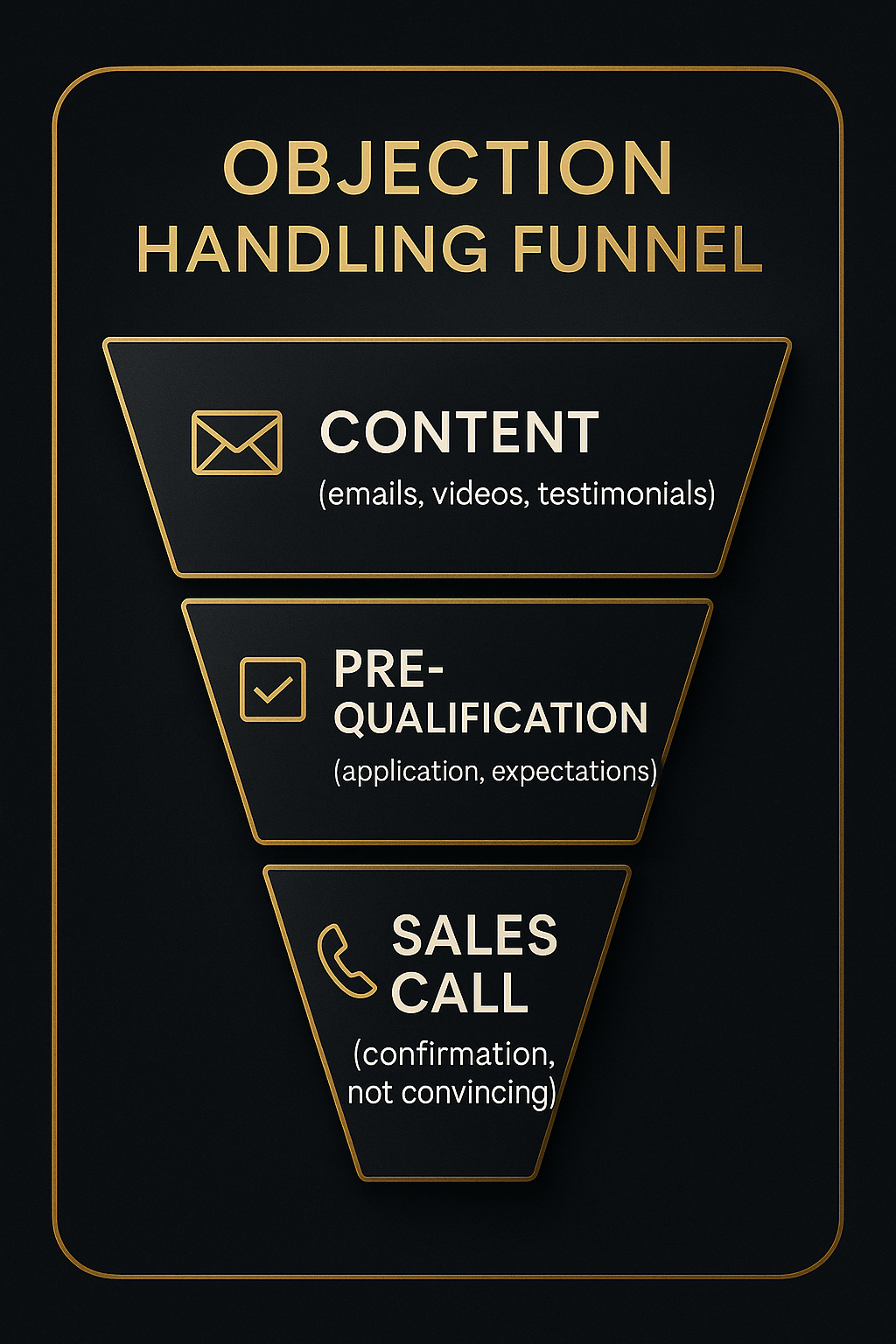
Use Content to Pre-Sell Authority
One of the most effective ways to overcome objections is through strategic content. Mastering the ability to learn sales techniques is crucial in this process, as it allows you to understand client needs and provide exceptional value.
Think:
- Case studies from similar industries
- Videos that walk through success stories
- Webinars that explain your sales process and methodology
- Emails that destroy objections one-by-one, addressing similar concerns and highlighting success stories from previous clients who had comparable apprehensions about pricing but ultimately found value in your product or service
When prospects consume this material before ever speaking to you, their resistance drops dramatically.
You’re not “convincing” anymore—you’re reaffirming.
Address Specific Concerns Through Social Proof
Don’t just show testimonials. Use them strategically.
Pick stories that speak directly to:
- Common sales objections
- Specific concerns like budget constraints, cash flow, or time investment
- Emotional triggers like fear of failure or overwhelm
When they see someone just like them winning with your offer, it quiets their doubt. Sharing success stories from previous clients who had similar concerns about pricing but ultimately found value in your product can be particularly effective.
That’s the power of emotional connection and social proof.
Leverage Deep Product Knowledge to Create Trust
When you speak with clarity and precision about your offer, prospects feel safe. High-ticket clients don’t care how smart you sound. They care how safe they feel. That’s why emotional intelligence isn’t just a soft skill—it’s a power move. The real pros don’t impress with jargon. They simplify the complex.
They break things down so clearly, so confidently, that the prospect leans in and thinks:
“Finally—someone who gets it.”
That’s how you build credibility and trust before discussing the initial price.
A confident sales professional anticipates objections—and removes them long before the close. Addressing the prospect’s concerns effectively is essential to reinforce the product’s unique value and benefits.
Rule #4: Be Willing to Walk Away
This is the most powerful closing move you can make:
Walking away.
Most entrepreneurs fear losing the sale. So they get pushed around by prospects who say:
- “Can you lower the price?”
- “I need to think about it.”
- “I’m shopping around.”
And in their fear, they fold—offering discounts, throwing in bonuses, or begging for a decision.
But high-ticket closers don’t chase. They hold frame.
They say:
“I understand if this isn’t the right time. The people I work with see the value right away. If this doesn’t feel aligned, I’d rather save both of us the time.” They also understand the importance of addressing the prospect’s concerns to effectively navigate objections and reinforce the product’s unique value and benefits.
That one move flips the entire sales conversation. You go from seller to selective authority. You’re no longer trying to convince them. They’re trying to convince you.
High-ticket closing isn’t about transactions. It’s about transformation.
If you treat your prospects like numbers, they’ll treat your offer like a commodity.
To close premium deals, you need to build real trust—by understanding your client’s pain better than they do… and showing them you have the only solution that makes sense.
It’s not about selling a product. It’s about becoming the advisor they can’t afford to ignore.
Detachment Is the Ultimate Power in Sales
Detachment doesn’t mean you don’t care.
It means your confidence isn’t dependent on the outcome of one call.
The strongest sales professionals are emotionally neutral.
They present with passion—but never with neediness.
This level of detachment builds trust because it proves you’re not desperate.
Prospects feel that.
And they lean in.
Create Scarcity Without Hype
Real scarcity isn’t fake countdown timers.
It’s this truth: You don’t have time for maybe buyers.
Let them know:
- You only take on a few clients each month
- Spots are limited
- When it’s gone, it’s gone
This isn’t a pressure tactic.
It’s a respectful boundary that protects your time and energy—and positions your offer as high-status.
When You Stop Needing the Sale, Prospects Chase You
It’s a paradox.
The moment you stop trying to close everyone…
…you start closing more high-quality clients.
Why?
Because confidence attracts.
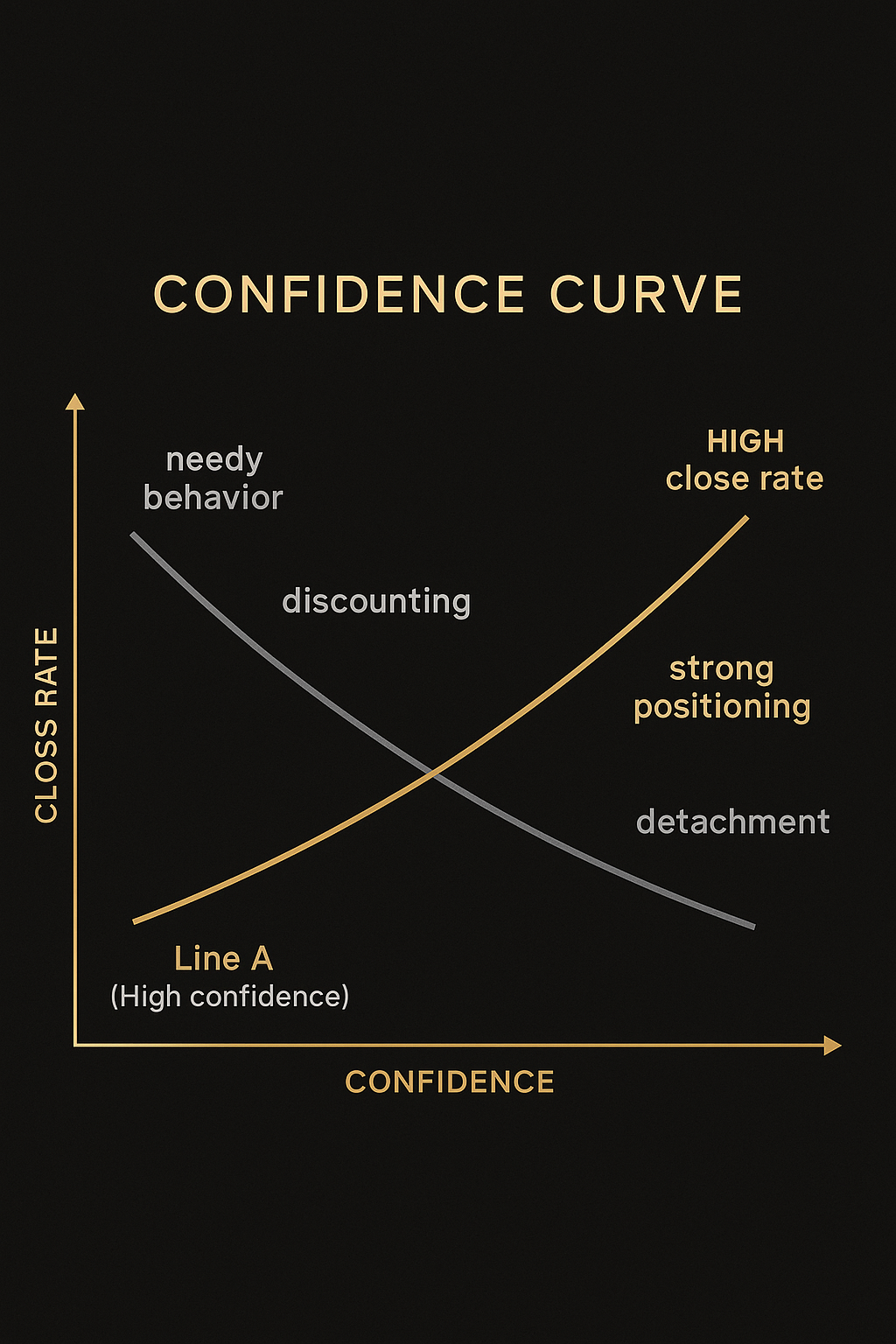
And nothing builds confidence like being willing to walk away from low-fit leads.
This is how high-ticket deals are closed—through certainty, posture, and control.
Building Relationships and Trust
In high-ticket sales, you don’t earn trust by being friendly—you earn it by being relevant.
The fastest way to build trust isn’t small talk. It’s understanding your prospect better than they understand themselves.
That means knowing their industry. Knowing their pain points. Knowing the patterns they’ve fallen into—and where those patterns are costing them money, time, and growth.
When a high-value prospect feels like you’re reading their mind, the sale starts writing itself.
Forget rapport. Build resonance.
You don’t need to be their buddy—you need to be the one person who truly gets what they’re going through… and knows how to fix it.
And that only happens when you stop talking… and start listening with intent.
Ask sharp, open-ended questions. Get to the root of their frustrations. Don’t settle for surface-level fluff. Dig until you uncover what’s really stopping them from winning.
Once you have that, you can present your solution as exactly what it is—custom-built to solve a high-stakes problem.
That’s how trust is built. Not through smiles. But through certainty, clarity, and relevance.
Establishing Genuine Connections with Prospects
If you want to close high-ticket deals, you must connect—strategically, not socially.
This isn’t about “building rapport.” You’re not here to charm them. You’re here to earn their respect.
The strongest connections are built when a prospect realizes, “This person gets me—and they’re not trying to please me, they’re trying to lead me.”
That shift happens when:
- You ask better questions than anyone else
- You challenge their assumptions
- You speak directly to the core of their problem—without sugarcoating it
Effective communication isn’t about saying more—it’s about saying what matters. Every word, every question, every story should serve one purpose: increasing clarity and increasing trust.
Prospects don’t want another pitch. They want someone who sees the bigger picture of their business, and who can offer insight—not pressure.
So stop “rapport-building.”
Start authority-building.
That’s how you create real connection—and become the only logical choice in the room.
Maintaining Trust Throughout the Sales Process
Trust doesn’t end when the call starts. It’s either strengthened—or lost—at every step of your sales process.
Prospects don’t just watch what you say.
They watch what you do.
Are you on time? Are you consistent? Do you do what you say you’ll do?
That’s what builds or breaks trust.
High-ticket clients don’t buy based on hype. They buy based on how reliable you are.
That means:
- Set expectations clearly—then exceed them.
- Tell the truth, even when it’s uncomfortable.
- Never overpromise just to close the deal.
- Communicate often, clearly, and with purpose.
You’re not just selling a product or service. You’re selling peace of mind.
You’re selling certainty.
And when you consistently show up as someone who’s organized, transparent, and proactive?
Trust becomes automatic. Resistance disappears. And the close becomes inevitable.
Going Beyond the Basics: High-Ticket Closing at the Next Level
Once you’ve mastered the fundamentals of high-ticket sales—frame control, value anchoring, and objection handling—it’s time to level up by incorporating effective sales strategies. These strategies are crucial in overcoming price objections, transforming them into opportunities to demonstrate the value of your product.
Because the best closers don’t just close deals… They close the right deals, at the right price, with the right clients.
Here’s how high-level sales professionals win in competitive markets and close more high-ticket deals—without ever sounding salesy. Using relatable stories, testimonials, and case studies that are specifically relevant to the prospect’s industry enhances credibility and connection, making the content more persuasive to potential customers.
Offer Tailored Solutions Based on the Prospect’s Industry
High-ticket clients don’t want a one-size-fits-all product or service.
They want to feel seen. They want to know that your offer was designed with their industry, business model, and challenges in mind. Highlighting a particular feature that addresses their specific needs can shift the discussion from cost to value, reassuring them about the worth of the investment.
That’s why top closers take time to:
- Reference industry-specific pain points
- Speak the language of the client’s world
- Position their offer as the most relevant and strategic choice
This approach builds trust, reduces resistance, and instantly raises the perceived value of your solution. Addressing the prospect’s concerns about price effectively reinforces the product’s unique value and benefits.
Highlight Safety Features and Risk Reduction
Another way to overcome financial constraints and price objections is to emphasize the safety mechanisms in your offer and showcase unique features that justify a premium price.
Think:
- Guarantees (if appropriate)
- Proven track records
- Success rate statistics
- Clear deliverables and checkpoints
Clients need to feel safe making a high-ticket investment. By showing that your process is structured, stable, and risk-aware, you ease their emotional resistance.
This creates an important psychological shift: You’re not selling—they’re choosing safety and certainty. Addressing the prospect’s concerns effectively is crucial to reinforce the product’s unique value and benefits.
Show Them the Bigger Picture
Low-level closers sell tactics. High-ticket closers sell transformation.
Help your clients see the broader impact of saying yes:
- Will this offer save them time to focus on growth?
- Will it improve team performance or eliminate a major bottleneck?
- Will it create compounding benefits over the next 12–24 months?
Understanding the unique concerns of potential customers is crucial. Selling the bigger picture means helping the client connect the dots between your offer and their long-term goals. Addressing the prospect’s concerns effectively can reinforce the product’s unique value and benefits.
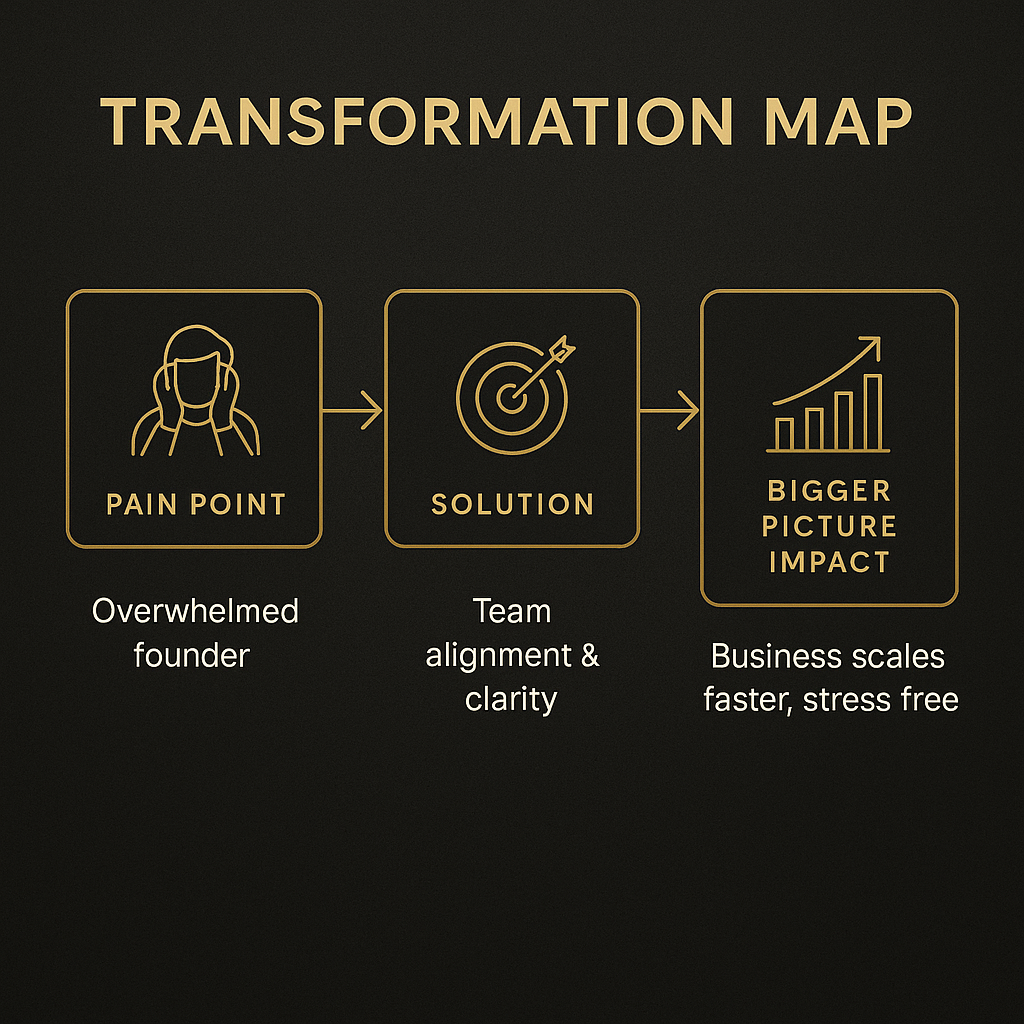
This shift reframes your price as not just affordable—but essential.
Closing High-Ticket Deals Like a Pro
Closing high-ticket deals isn’t about charm or charisma.
It’s about control, certainty, and positioning.
If you’re still getting price objections, struggling to explain your value, or trying to “build rapport,” you’re playing the wrong game.
High-ticket closers don’t convince.
They frame. They lead. They close with confidence.
Here’s how the best do it:
Handle Price Objections Before They Happen
If a prospect’s biggest concern is price, they haven’t seen the value yet. That’s not their fault. That’s yours.
You don’t wait until the end of the call to justify the cost.
You make the price feel irrelevant before it even comes up.
How?
- Show the cost of inaction
- Highlight long-term value and cost savings
- Make your offer feel like the shortcut they’ve been looking for
Because once they understand the ROI, the sticker price feels like a steal.
Demonstrate Value with Precision
Value isn’t what you say—it’s what the prospect sees.
You must diagnose the pain, articulate the solution, and position your offer as the only logical answer. That means speaking to their goals, their frustrations, and their blind spots—better than they can themselves.
Tailored solutions > generic pitches.
That’s how closers separate themselves from “just a salesperson.”
Build Trust Through Authority, Not Flattery
You don’t build relationships by being liked.
You build them by being respected.
High-ticket clients trust people who:
- Ask the right questions
- Actually listen
- And lead with certainty
Connection comes from clarity.
Loyalty comes from results.
And long-term relationships?
They’re built on outcomes—not empty promises.
Close Like the Authority You Are
If you want to close high-ticket deals consistently, stop selling like everyone else.
Control the frame.
Position the value.
Lead the conversation.
That’s how you stop chasing… and start attracting.
High-Ticket Sales Is a Skill—And Every Skill Can Be Improved
Even the best closers track their performance.
Why?
Because in high-ticket sales, small shifts create massive results.
If you want to close more premium deals, you need visibility into what’s working, what’s stalling, and where your sales process needs tightening.
Track the Metrics That Actually Matter
Forget vanity metrics.
What matters is:
- Conversion rate: How many qualified leads become clients?
- Average deal size: Are you consistently closing high-ticket offers?
- Sales cycle length: Are you moving prospects through the funnel efficiently?
- Objection frequency: What concerns are coming up again and again?
These sales performance indicators reveal whether your messaging, targeting, and objection handling are aligned—or off.
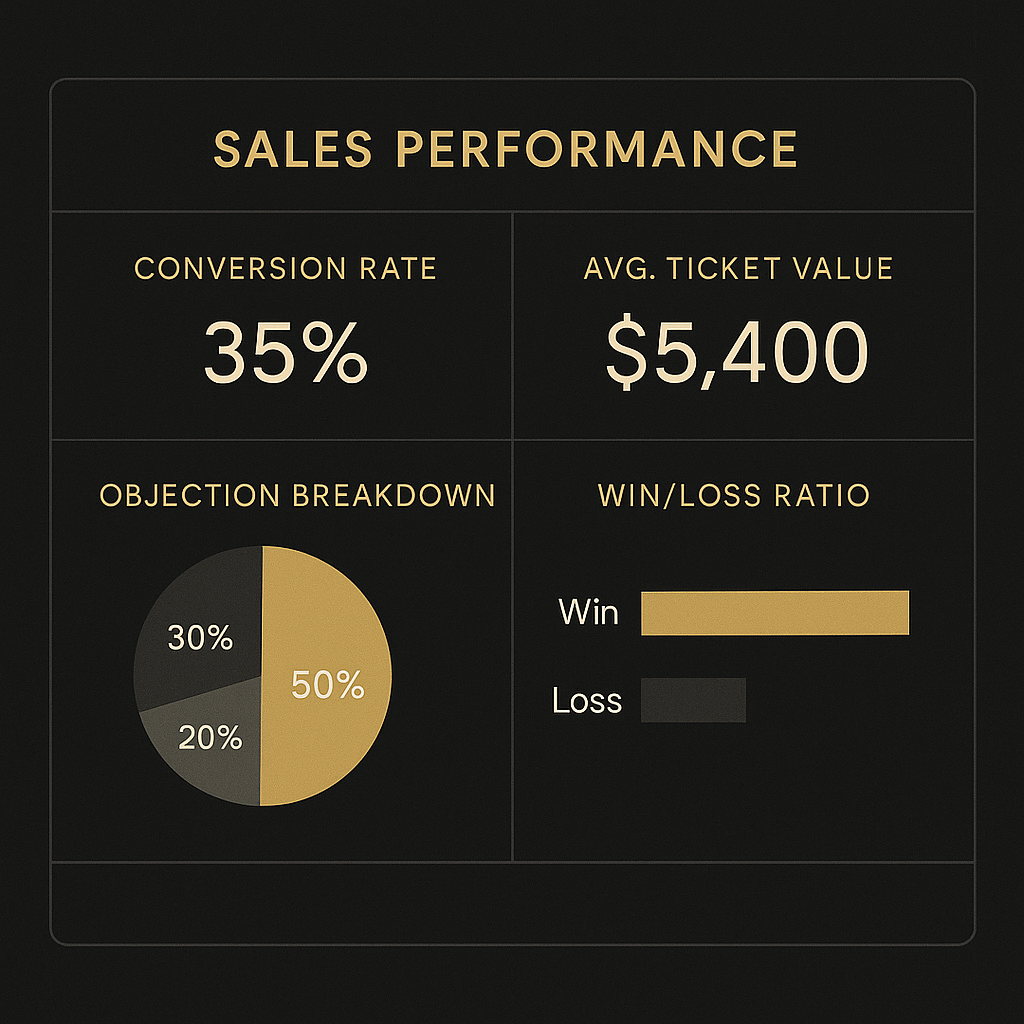
Commit to Continuous Learning and Feedback
Markets evolve. Buyer psychology changes.
What worked six months ago might be outdated today.
That’s why top-tier sales professionals are obsessed with continuous improvement.
They review calls.
They test new frameworks.
They get coaching.
They study industry trends and refine their positioning based on what’s resonating right now.
In a high-ticket environment, staying sharp is non-negotiable.
This mindset separates amateurs from elite closers.
Close Premium Clients with Confidence—No Discounts Required
You don’t need to slash your prices to close more deals.
You don’t need to offer discounts, chase prospects, or negotiate your value.
You just need the right high-ticket closing strategy.
When you:
- Control the frame from the start
- Anchor the value, not the price
- Eliminate objections before they arise
- Stay detached and walk away when needed
- Tailor your solutions and show the bigger picture
- And track your performance with ruthless honesty…
You position yourself as the only logical choice in a sea of sellers.
That’s what high-ticket closing is all about.
It’s not about pressure. It’s about posture.
Not about persuasion—but positioning.
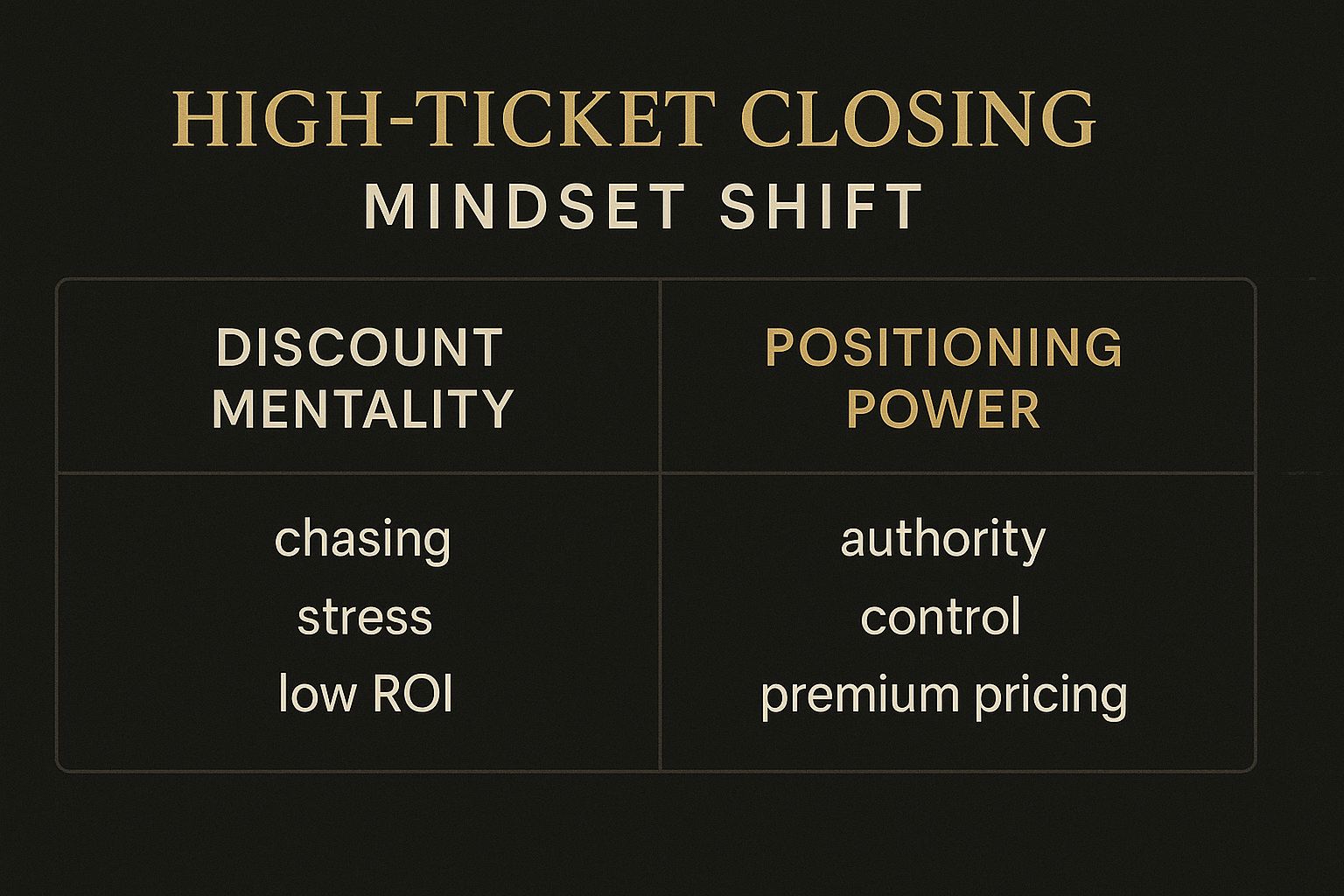
Ready to Master High-Ticket Closing?
If you’re done chasing low-quality leads, offering discounts just to get a “yes,” and working with clients who drain your energy…
And you’re ready to attract high-value clients who respect your time, recognize your value, and are ready to invest…
Then it’s time to join the S.M.A.R.T. Challenge.
Inside, you’ll learn the proven framework to close premium clients with certainty, authority, and confidence—without begging, convincing, or lowering your price.
Click here to claim your spot in the S.M.A.R.T. Challenge now.
